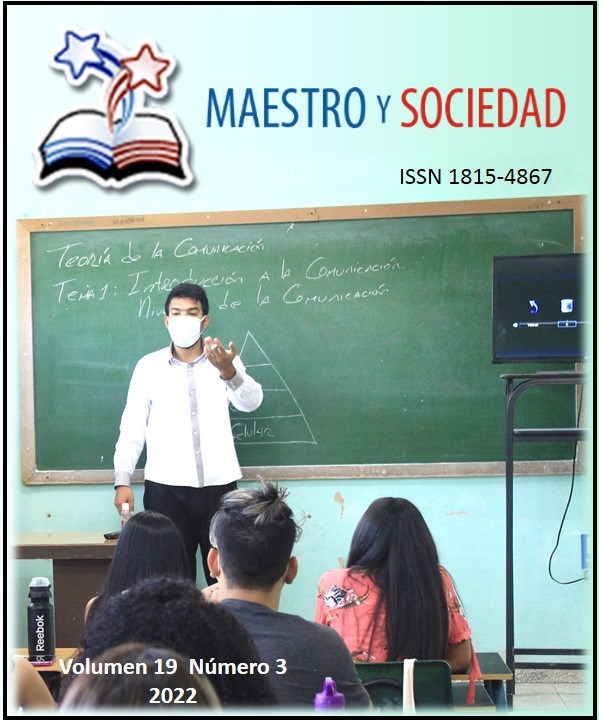Some theoretical considerations of the process of appreciation of the work of art
Some theoretical considerations of the process of appreciation of the work of art
Keywords:
artistic appreciation, permanent education, Cuban art.Abstract
This article addresses the main theoretical references that allow the foundation of the process of artistic appreciation in lifelong learning. For its analysis, a brief historical characterization is made, which shows the content of art and its appreciation weighed down by a marked technical and intellectual value, permeated by formalism and pragmatism; because all analysis of what to do with art and its appreciation for educational purposes is carried out from morphological terms accompanied by a sequential neglect and lack of systematization. This situation was a reflection, on the one hand, of the fragmentation of the discipline and, on the other, of an excessive technicality, not always accompanied by training actions in response to the necessary changes and the role in the teaching-learning process and its consequent theoretical-practical implications, with the adequate methodological treatment of each of the actions of the aesthetic-artistic skills, which express an integrating vision.
References
Arnhem, R. (1962). Arte y percepción visual. EUDEBA. www.wikilcarmng.com/articulo-gusto-estetico-en-la-sociedad-Posindustrial-elgusto-por-lo-interesante-y-pintoresco/17785-2
Acha, J. (2016). Las actividades básicas de las artes plásticas. Editorial Adagio.
Alfaro, T. (2021). Expresión y Apreciación de las artes plásticas. Modernización educativa.
Ares, G. (2021). La Apreciación Plástica como aspecto importante del desarrollo estético de nuestros educandos. Revista Educación, (25), 32.
Aznárez, J. P. (2018). La necesidad de educar en artes visuales. Arte y movimiento, 18, 17-41. https://revistaselectronicas.ujaen.es/index.php/artymov/article/view/3914
Cabrera, R. (2021). El yo de la creación artística. Una visión curricular. http://portal.UNESCO.Org/fr/files/19772/20820159163cabrera.Pdf
Costa, S. (2018). La percepción visual de las interficies. (s.e.).
Eco, U. (2018). Apocalípticos e integrados. Editorial Labor. www.capurro.de/pregunta.htm
Fajardo, C. (2021). El gusto estético en la sociedad post industrial. www.wikilcarmng.com/articulo-gusto-estetico-en-la-sociedad-Posindustrial-elgusto-por-lo-interesante-y-pintoresco/17785-2
Fuentes, C. (2017). Modelo Holístico Configuracional de la Didáctica. Universidad de Oriente. www.wikilcarmng.com/articulo-gusto-estetico-en-la-sociedad-Posindustrial-elgusto-por-lo-interesante-y-pintoresco/17785-2
Gadamer, H. G. (1993). La verdad y método II. www.wikilcarmng.com/articulo-gusto-estetico-en-la-sociedad-Posindustrial-elgusto-por-lo-interesante-y-pintoresco/17785-2
González, R. (2016). Sujeto y Subjetividad: una aproximación histórico-cultural. Editorial Pueblo y Educación.
Hernández, F (2020). La necesidad de repensar la educación de las artes visuales y su fundamentación en el estudio de la cultura visual. Congreso Ibérico de Arte-Educación.
Kennedy (2005). Models of Continuing Professional Development. Journal of In-service Education, 31(2), 235-250. https://www.researchgate.net/publication/232902672_Models_of_Continuing_Professional_Development_A_framework_for_analysis
Rivera, E. F. (2013). Estructuras de sentido de la educación artística en la formación de maestros. Historia de la Educación Colombiana, (16). https://revistas.udenar.edu.co/index.php/rhec/article/view/1748
Nava, O. (2019). La comprensión hermenéutica en la investigación educativa. (s.e.).
Published
How to Cite
Issue
Section
License
Copyright (c) 2022 Enrique Alfonso Rizo-Chig, Inés Bárbara-Verdecia, Enrique Manuel Rizo-Barrera, José Enrique Ricardo-Lazo

This work is licensed under a Creative Commons Attribution-NonCommercial-NoDerivatives 4.0 International License.
This journal provides immediate open access to its content, based on the principle that offering the public free access to research helps a greater global exchange of knowledge. Each author is responsible for the content of each of their articles.



























 Universidad de Oriente
Universidad de Oriente 